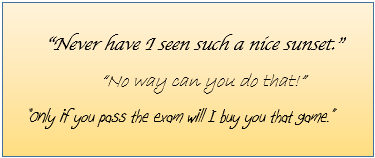‘Inversion’ means to reverse, or invert, the normal subject–verb word order in a sentence.
Inversion is often used to add emphasis. However, it is rarely used in casual conversation. It is more common in formal written or spoken English, such as by politicians or in prepared speeches.
To invert a sentence the adverbial (e.g. never, rarely, not only, etc.) is put at the beginning and the positions of the subject and auxiliary verbs are changed. The word order is like a question and the auxiliary verbs ‘do’ or ‘did’ should be added where applicable. Most adverbials can be used with any tense, except “no sooner” which is generally followed by the past or past perfect.
Not only
Not only can I swim, I can dive too.
Not only was he the smartest actor in Hollywood, he was the most charismatic too.
Not only do I have a yacht, but I also have a private jet.
Not only will I wash the dishes, but I’ll also do the laundry.
No sooner
No sooner did I get home than I had to take the dog out for a walk.
No sooner had I finished lunch than the phone rang.
No sooner will he wake up than he will feel hungry.
At no time
At no time did I say anything. At no time have I been in trouble at school.
At no time could I help. At no time will I get married.
Only
Only when I marry will I buy a house.
Only when I finished high school did I start taking driving lessons.
Only after I had studied English for three years did I understand ‘until’ and ‘before’.
Only after I die will I be happy!
Little
Little did he know that he would be fired from his job after only three weeks.
Little do people realise how many steps are needed to make a computer chip.
Other types
The following types are typically found at train stations or libraries, or in the terms and conditions of a contract, and so on.
Under no circumstances should passengers walk on the tracks.
At no time may books be taken into the café.
On no account is smoking permitted in this building.
On no condition can insurance be claimed if the user is found to be under the influence of drugs or alcohol.
Informal English
The most common type of inversion used in everyday conversation is ‘No way…’
No way can you do that!
No way would I ride on that rollercoaster!
ラボール英会話教室.png)
